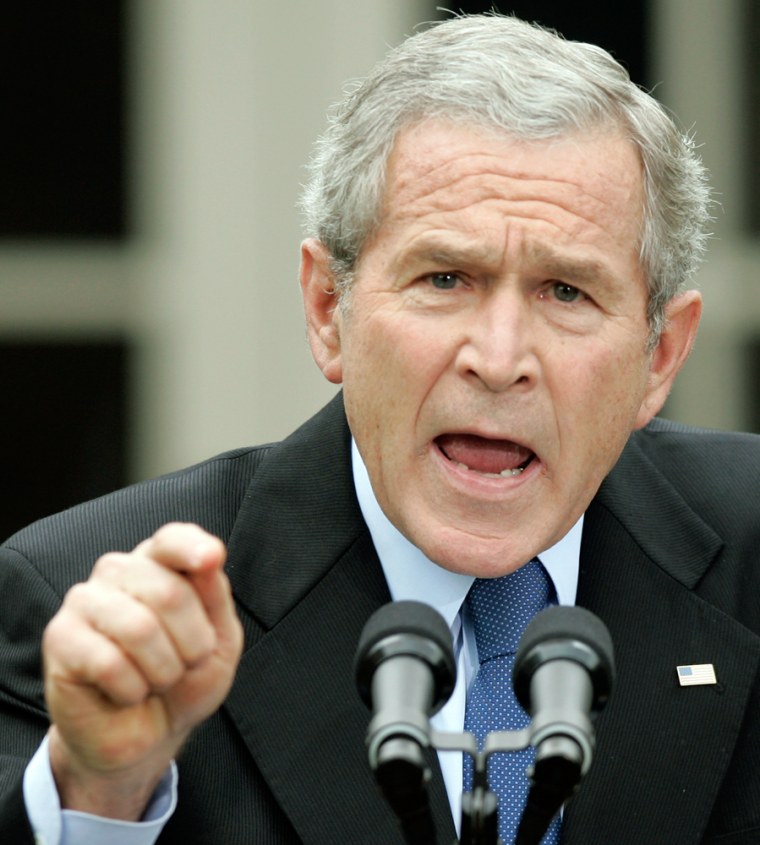President Bush, ahead of his trip next week to an Asian summit, said it's possible that North Korea will give up its nuclear weapons program before he leaves office.
"Can it happen before I'm through? Yes, it can. I hope so," Bush told foreign journalists Thursday at the White House.
He spoke for 45 minutes in the Roosevelt Room about Iraq, climate change, terrorism, trade, and U.S. relations with China and other Asian nations.
In an interview with Australia's Sky News network, Bush said he would be concerned about China's military if the country ever turned hostile.
"My view of China is that they're internally focused to the extent that they want economic growth and vitality, they're externally focused in order to get the raw materials they need, but if they ever turn hostile, I would be concerned about the military," Bush said.
He also urged countries considering pulling troops out of Iraq to base their decisions on restoring the country's security, saying the U.S. needs "all our coalition partners" in the troubled nation.
APEC in Australia
The president, who leaves Monday for Sydney, Australia, for his seventh Asia Pacific Economic Cooperation meeting, expressed frustration with the slow work in getting North Korea to dismantle its nuclear programs. Yet, he said the United States, China, South Korea, Russia and Japan are making progress in their goal of achieving a de-nuclearized Korean peninsula.
North Korea agreed in 2005 to disclose and dismantle all aspects of its nuclear weapons program. The International Atomic Energy Agency said the communist regime is cooperating with U.N. experts overseeing the mothballing of key nuclear facilities; IAEA experts last month confirmed the shutdown of four nuclear facilities at Yongbyon.
"Here we are in 2007, nearly two years later, where we're still reminding them of that agreement," Bush told the foreign journalists and reporters from The Associated Press and other wire services.
"On the other hand, a lot has happened in the last couple of months that would lead me to believe that we're on - we're making progress," the president said, adding that resolving the dispute rests with North Korean leader Kim Jong Il. "And we will continue to push toward the full disclosure and dismantlement."
Environmental concerns
On other issues, Bush said he will tell leaders at the summit that he takes the issue of climate change seriously and that nations emitting the most greenhouse gases need to reach an accord to address the problem.
The U.S., which along with China leads the world in emitting carbon dioxide and other gases that scientists say are warming the planet, has called for a Sept. 27-28 conference in Washington of the 15 biggest polluters.
"I don't want to single China out, but China has got a major role to play," the president said. "Any agreement without China is not going to be an effective agreement. So my strategy has been to get China at the table."
Bush will join leaders from 20 other nations, which with the United States account for 56 percent of the world's gross domestic product. An estimated 66 percent of U.S. exports go to the region.
Financial factors
Trade, particularly the global commerce talks known as the Doha Round, is the top U.S. economic priority at the summit. Failure by the United States, European Union, Brazil and India to eliminate trade barriers to farm produce and manufactured goods could be fatal for the talks.
Bush said a successful conclusion of the Doha Round would fend off protectionism and help ease poverty. The United States also plans to use the summit to push for the long-term goal of a Pacific-wide free trade zone. The sprawling APEC free-trade area - stretching from the U.S. to Russia and from Chile to Australia - would cover 40 percent of the world's population.
While some APEC members have balked at the idea, others argue that it would standardize the plethora of bilateral free-trade deals in the region and serve as a backup in case the Doha Round never culminates in an agreement.
In addition to meeting with leaders from the APEC member nations, Bush is to talk with Kevin Rudd, leader of the opposition Labor Party in Australia, who has called for withdrawing Australian troops from Iraq.
Bush, who plans to meet with Australian troops while in Sydney, said he would tell Rudd that the "stakes in Iraq are very high for peace," that leaving Iraq too early will embolden the enemy and that decisions about troop deployments should be driven by conditions on the ground.
That's the same message Bush is sending Congress, which is getting ready to receive the latest White House progress report on Bush's decision to send 30,000 more troops to Iraq in January. Gen. David Petraeus, the top commander in Iraq, and Ryan Crocker, the U.S. ambassador there, are scheduled to begin testifying to Congress the day after Bush returns.
